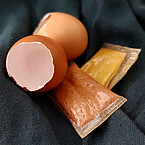Detail view
Simply EGG-genious: Students invent edible packaging from eggshells [26.04.23]
Award-winning product from the University of Hohenheim: Packaging made from old eggshells impresses the jury as packaging for bagged soups, can be eaten & provides valuable additional proteins Video about product & winning team: www.youtube.com/watch
Ready-made meals like ramen noodles are ideal for quickly satisfying hunger: Open the bag, stir – done! However, the quick snacks produce a lot of environmentally harmful plastic waste. To tackle this problem, the student team EDGGY from the University of Hohenheim in Stuttgart rolled up its sleeves and developed edible packaging made from eggshells and other plant-based raw materials. And even better: they simply dissolve in the hot water and can be eaten as an additional protein boost. For this sustainable and innovative idea, the five students received the prize for the most innovative idea at the EIT Food Reuse2Repack Challenge and prize money of EUR 1,200. Video about product & winning team: www.youtube.com/watch
Tasty-hip Asian noodles should be enriched with proteins instead of plastic waste – with this conviction, 5 students from the University of Hohenheim developed edible food packaging made from recycled eggshells that simply dissolves in hot water. From left to right: Cora Schmetzer, Lina Obeidat, Alena Fries, Bahar Abrishamchi, and Paulina Welzenbach | Image Source: EDGGY / Cora Schmetzer
When it’s dry, the 4 x 2 centimeter bag looks like normal plastic. But just a little hot water is enough, and within seconds there is nothing left of it.
No plastic waste that’s harmful to the environment when snacking. “By using proteins, our packaging is even really healthy!” stated Lina Obeidat, who is studying for a Master’s degree in Food Science at the University of Hohenheim.
Obeidat had the brilliant idea while cooking with her mother: "We had cracked eggs for our dish. The moment I was about to throw the shells away, the idea ran through my mind: What protects the egg should also be suitable as packaging, shouldn’t it?”
The name says it all: Eggshells and Cutting EDGE Research
In her module, Obeidat found four fellow students who got enthusiastic about the idea. Alena Fries, Bahar Abrishamchi, Paulina Welzenbach, Cora Schmetzer, and Lina Obeidat competed as Team EDGGY in the EIT Food Solutions: Reuse2Repack Challenge. The competition is about developing a bio-based packaging solution from food waste.
Their idea and claim is also reflected in their product name: Cutting EDGE research and the use of EGGs.
Successes and setbacks: Experience research – and be successful
However, it was to take another 9 months before success was achieved. "Before the first experiments, we first studied technical literature extensively,” recalled Alena Fries. “The whole thing was definitely not a linear process. In the laboratory, we kept reviewing our approach, adjusting the methods and analyzing the results. For example, we experimented with starch, but discarded that idea: The packaging just became way too hard.”
Or they studied the drying process: “When is it too wet, when is it too dry? So we were constantly turning the cogs and examining each prototype for strengths and weaknesses – until we finally got the best result.”
And that is ingeniously simple: “Our packaging is made from a simple mixture of vegetable protein, eggshells, and structuring plasticizers such as water,” said Bahar Abrishamchi. “It’s nothing fancy or complicated – but it works.”
From the challenge to a start-up?
“The production of this packaging material was a journey that was as rewarding as it was challenging,” said Cora Schmelzer. “The Resuse2Repack Challenge has allowed us to go through a research cycle while gaining our own entrepreneurial skills that can be applied to many different areas of life.”
The challenge is now over, EDGGY won the prize for the most innovative idea, and it was honored for this achievement in Rome in November. Is that the end of the product and the end of the team? No, say all five. And Paulina Welzenbach added: “Our product can and needs to be improved, and we want to pursue that, maybe even create our own start-up.”
Nevertheless, they are already proud that “we at EDGGY have developed an idea that can reduce plastic waste. And we’re excited to see what the future holds for us.”
BACKGROUND: EIT Food Solutions
Reuse2Repack Challenge – Rethinking food packaging for regenerating resources
The climate crisis, environmental pollution, but also the depletion and scarcity of resources require new, innovative ways of thinking: From the design of packaging, to recycling to new ways of producing packaging materials. To develop these new ways of thinking and ways of doing things, EIT Food, a “knowledge & innovation community” of the European Union, called on students to participate in the Reuse2Repack Challenge 2022. The teams were supported by mentors from the university and industry over a period of nine months.
More about EIT Food: https://www.eitfood.eu/
BACKGROUND: Start-up assistance at the University of Hohenheim
The University of Hohenheim offers a broad concept for start-up support. A central element of this is the Innovation Greenhouse – a greenhouse for ideas and innovations with its own premises on the university campus. It is a showroom and co-working space for people interested in starting a business, offers a FabLab to quickly turn ideas into prototypes, workshops and pitching events – in short: a vibrant start-up culture. The Hohenheim guiding theme of bioeconomy always plays a special role.
More about the InnoGreenhouse: https://inno-greenhouse.uni-hohenheim.de/
Video about product & winning team: https://www.youtube.com/watch?v=Ls19GbmN4qk
Text: Schmid
Back to










